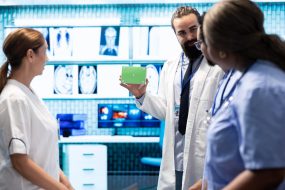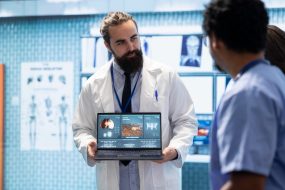- Home
- Technology & AI
- Olympus Launches AI Program to ...

CENTER VALLEY, Pa. — Olympus has introduced its first ai program in the U.S., a software application designed to help detect precancerous polyps and adenomas during colonoscopy.
The new software, known as Caddie, runs on Olympus’ Olysense platform, which Olympus describes as the foundation for a broader intelligent endoscopy system capable of integrating with hospital data. Caddie uses cloud-based computer-aided detection (CADe) to analyze recorded colonoscopy video and flag lesions at risk of developing into cancer.
A randomized clinical trial conducted across eight European hospitals found that Caddie improved detection rates over unassisted colonoscopy. Results included:
-
A 136% relative increase in identifying large polyps greater than 10 millimeters,
-
A 93% increase in large adenomas,
-
A 29% gain in small adenomas (≤ 5 mm),
-
A 57% increase in flat adenomas,
-
A 230% increase in sessile serrated lesions,
The study also reported no increase in unnecessary biopsies or extractions.
Caddie, cleared by the FDA in July 2024, will be made available via a software update for Olympus’ Evis X1 and Exera III endoscopy systems. The program enters a competitive space alongside Medtronic’s GI Genius, developed by Cosmo Pharmaceuticals.
Olympus acquired Caddie through its 2023 purchase of U.K.-based Odin Vision (a University College London spinout) for approximately $79 million. In addition to Caddie, Odin holds CE Mark approvals in Europe for its Cadu and SmartIBD programs, which are tailored for Barrett’s esophagus and ulcerative colitis.
“With the Olysense platform, we are taking a meaningful step forward in helping patients receive early, accurate diagnoses,” said Keith Boettiger, head of gastrointestinal solutions at Olympus.
Additional Content / Outlook
In real-world implementation, hospitals adopting the ai program will need to ensure seamless integration with existing workflows, training of endoscopists, and data security measures. Early adopters are expected to monitor metrics such as adenoma detection rate (ADR), lesion miss rate, and false positives to assess performance.
Competitors in this field such as Medtronic’s GI Genius have shown their own improvements in polyp detection. A U.S. trial revealed that GI Genius reduced the miss rate of colorectal polyps and adenomas by about 50% compared to standard colonoscopy. Medtronic News However, some studies in community settings have reported mixed benefits in adenoma detection rates when using such systems outside major academic centers. Lippincott Journals
How the ai program Enhances Colonoscopy Precision
This section can explain how Caddie supports gastroenterologists during procedures, improving detection rates of various types of lesions without increasing unnecessary biopsies.
Looking ahead, Olympus may further expand the ai program capabilities — for example, adding features for real-time guidance, automated segmentation of lesion borders, or integration with pathology and longitudinal patient data. As more centers adopt such tools, comparative studies of different systems (Caddie, GI Genius, Endo-AID, etc.) will help clinicians understand relative strengths and performance trade-offs. PMC+1
In summary, Olympus’s launch of this ai program marks a significant step in enhancing colonoscopy performance. Over time, outcomes data, cost–benefit analyses, and user adoption will determine how widely it becomes part of standard of care in gastroenterology.
As the ai program continues to roll out across U.S. healthcare facilities, experts believe its real value will be measured by improvements in screening efficiency and patient outcomes. Gastroenterologists often face challenges in detecting flat or serrated lesions, which can be easily overlooked during routine colonoscopy. By supporting physicians in real time, the system helps maintain focus during longer procedures and ensures no subtle abnormality goes unnoticed.
Several healthcare systems are planning pilot projects to integrate the ai program within existing electronic health record platforms, allowing for better documentation, performance tracking, and follow-up. This integration could help physicians identify patients who need additional surveillance sooner, potentially preventing the progression of polyps to cancer.
Another important aspect involves training. Endoscopists must understand how to interpret the visual cues generated by the ai program, distinguishing true positives from possible artifacts. Olympus has announced plans to offer specialized workshops, virtual demonstrations, and hands-on training sessions for gastroenterology teams, ensuring a smooth transition into everyday clinical workflows.







